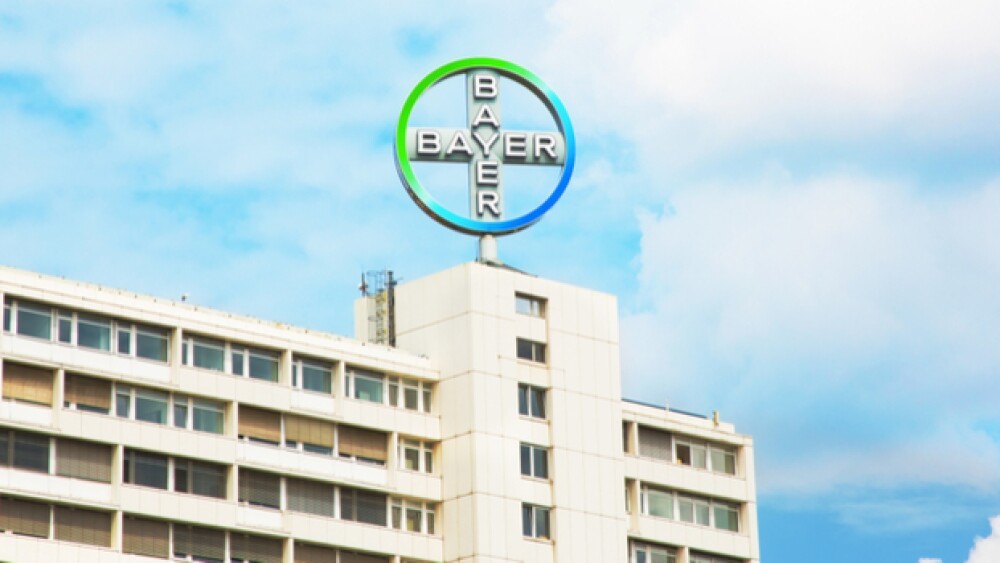The U.S. Food and Drug Administration (FDA) gave the green light late Monday to Bayer oncology drug Vitrakvi, a first-of-its-kind TRK inhibitor, after late-stage clinical trial results showed a 75 percent overall response rate and 22 percent complete response rate across various solid tumors.
LUMIKK555 / Shutterstock.com
The U.S. Food and Drug Administration (FDA) gave the green light late Monday to Bayer oncology drug Vitrakvi, a first-of-its-kind TRK inhibitor, after late-stage clinical trial results showed a 75 percent overall response rate and 22 percent complete response rate across various solid tumors.
Vitrakvi, an oral TRK inhibitor, was approved under priority review for the treatment of pediatric and adult patients who have solid tumors that have a neurotrophic receptor tyrosine kinase (NTRK) gene fusion without a known acquired resistance mutation, are metastatic or where surgical resection is likely to result in severe morbidity, and have no satisfactory alternative treatments or that have progressed following treatment. The drug will be available to patients this week, Bayer said in its announcement. The medication will be available in liquid and tablet form.
Vitrakvi (larotrectinib), which was co-developed by Bayer and Loxo Oncology, was approved by the FDA under accelerated approval and is the first treatment to receive a tumor-agnostic indication at the time of the initial regulatory approval, Bayer said. Bayer submitted a Marketing Authorization Application (MAA) in the European Union in August.
Robert LaCaze, Bayer’s head of oncology, said the approval of Vitrakvi is a result of years of hard work and research focused on bringing the “first ever treatment to patients with TRK fusion cancer.” NTRK gene fusions are genomic alterations that result in constitutively-activated chimeric TRK fusion proteins that can act as an oncogenic driver, promoting cell proliferation and survival in tumor cell lines. During trials, Vitrakvi showed clinical benefit across numerous unique tumor types, including lung, thyroid, melanoma, GIST, colon, soft tissue sarcoma, salivary gland and infantile fibrosarcoma, Bayer said.
“TRK fusions are rare, but occur across many different tumor types. In this era of precision medicine, we are delivering on Bayer’s commitment to advance the future of cancer care while providing value for patients and physicians. It is very rewarding to provide a therapy specifically for patients with advanced solid tumors harboring an NTRK gene fusion,” LaCaze said in a statement.
Loxo Oncology Chief Executive Officer Josh Bilenker touted the investigators, researchers and patients who were part of the clinical trials that helped Vitrakvi receive FDA approval. He called it a “testament to the relentless prioritization of biology in the drug development process.” With the approval of the drug, Bilenker said it will be critical to screen cancer patients with advanced solid tumors for “actionable genomic insights” that could benefit their care.
David Hyman, head of early drug development at Memorial Sloan Kettering and a principal investigator of Vitrakvi, said the FDA’s approval marks a milestone in the way physicians will treat cancer patients who have an NRTK gene fusion. Hyman said that as he worked with the drug during the trials, he saw first-hand how treatment with Vitrakvi “can deliver clinically meaningful responses in patients with TRK fusion cancer, regardless of patient age or tumor type.” He added that the public now has the first therapy approved for this genomic alteration, regardless of the type of solid tumor they have.
While Vitrakvi is a first-of-its-kind treatment, there are some safety concerns. The drug comes with a warning from the FDA over neurotoxicity, hepatotoxicity and embryo-fetal toxicity. During clinical trials the most common adverse events that were observed in more than 20 percent of patients included increased alanine aminotransferase (ALT), increased aspartate aminotransferase (AST), anemia, fatigue, nausea, dizziness, cough, vomiting, constipation and diarrhea, Bayer said.





